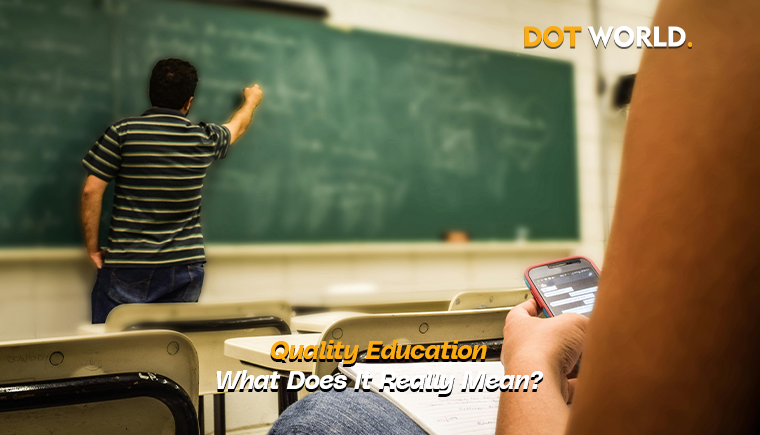We often hear politicians, educationists, and parents talking about the need for “quality education in Pakistan.” But what does that actually mean? Is it just about better buildings and more textbooks, or does it go deeper than that?
In today’s complex and rapidly changing world, defining quality education goes far beyond the four walls of a classroom. It is about access, equity, relevance, and the kind of learning that actually prepares children for life — not just exams.
This blog explores what quality education truly entails, especially in the context of Pakistan’s education landscape. We’ll look at why it matters, where we are falling short, and what needs to change — from school standards to the curriculum itself.
🎯 Defining Quality Education
The concept of quality education is not about a single feature. It is a combination of:
- Qualified and trained teachers
- Inclusive and safe learning environments
- Up-to-date curriculum
- Student-centric teaching methods
- Assessment that focuses on understanding, not memorization
Globally, organizations like UNESCO define quality education as one that ensures “all learners acquire the knowledge, skills, values and attitudes to lead a productive life, make informed decisions and contribute positively to society.”
In the case of Pakistan, the goal is clear: every child deserves education that empowers them — not just academically, but socially, emotionally, and morally.
🇵🇰 The Reality of Education in Pakistan
Pakistan faces an education crisis — and not just in terms of enrollment or literacy. Even in schools where children are enrolled, the quality education in Pakistan remains alarmingly low.
According to various national surveys:
- 4 out of 10 students in Grade 5 cannot read a sentence in Urdu or English meant for Grade 2.
- The learning outcomes in mathematics and science are equally poor.
- Even elite urban schools often fail to impart critical thinking, creativity, or emotional intelligence.
Clearly, the issue isn’t just lack of schools — it’s what’s happening (or not happening) inside those schools.
📚 School Standards: The First Layer of Quality
To ensure quality education in Pakistan, the first step is setting and enforcing minimum school standards. This includes:
- Safe and clean infrastructure
- Student-teacher ratio below 30:1
- Regular teacher attendance and supervision
- Basic facilities like electricity, water, and toilets
- Access to libraries, labs, and learning resources
Unfortunately, in both public and many low-cost private schools, these school standards are often ignored. Without basic physical and administrative infrastructure, how can we expect meaningful education?
👩🏫 Teachers: The Core of Quality
You can’t have quality education in Pakistan without competent, passionate, and well-supported teachers. Teachers are more than just knowledge transmitters — they are role models, mentors, and facilitators.
But in many schools:
- Teachers are undertrained and underpaid
- Professional development is rare or outdated
- There’s little accountability for performance
- Many rely on rote teaching methods instead of engaging students
Fixing the education system must include investing in teachers — their training, salaries, well-being, and recognition.
🧠 Curriculum: What Are We Teaching?
One of the biggest obstacles to quality education in Pakistan is the outdated and overloaded curriculum.
Here’s what’s wrong with the current system:
- Too much emphasis on rote memorization
- Irrelevant topics that don’t reflect students’ realities
- Lack of critical thinking, ethics, and life skills
- No flexibility or local contextualization
A modern curriculum must focus on real-world relevance, multicultural understanding, emotional intelligence, and problem-solving skills — not just textbook knowledge.
🧪 Assessment: What Are We Testing?
Another serious problem is our exam system. Students are judged almost entirely on how well they can reproduce memorized content. Creativity, comprehension, and reasoning are rarely tested.
Quality education demands:
- Continuous assessment methods
- Project-based learning
- Practical application of knowledge
- Feedback-driven improvement
Until we move away from “ratta culture”, true education will remain out of reach for millions of children.
🌍 Equity & Inclusion: Who Is Left Behind?
A quality education in Pakistan must also address who gets to learn. The reality is:
- Girls are still denied schooling in many rural areas
- Children with disabilities lack support or infrastructure
- Refugee and minority children face exclusion
- Language barriers prevent understanding in early years
Ensuring school standards also means making schools inclusive — places where every child feels safe, welcomed, and empowered to learn.
📱 Technology & Digital Divide
In today’s world, quality education must embrace digital tools — but without creating more inequality.
During COVID-19, thousands of students shifted to online learning. But most rural and low-income families had no internet access or devices. This digital divide exposed another crack in our fragile education system.
Going forward, hybrid models — combining classroom and digital learning — should be part of the new curriculum planning. But this must be done with equity in mind.
🧩 Parents’ Role in Ensuring Quality
Parents play a vital role in shaping a child’s attitude toward education. However, in Pakistan:
- Many parents are unaware of their rights
- Few understand what “quality” actually means
- Engagement with schools is minimal, especially in low-income areas
Building strong school-community relationships and educating parents on school standards, curriculum, and teaching quality is essential for long-term reform.
💡 Policy-Level Reforms for Quality Education
Several government efforts have been made — from the Single National Curriculum to education emergency declarations. But these will remain on paper unless implemented with sincerity and accountability.
Here are some policy-level solutions to ensure quality education in Pakistan:
- Introduce national school standards with strict monitoring
- Revise curriculum every 5 years with input from teachers and educationists
- Establish a nationwide teacher training and evaluation framework
- Invest in early childhood education
- Build partnerships with NGOs and private sector for resource sharing
- Focus on evidence-based policymaking, not just slogans
🔄 Quality Is a Process, Not a Product
One important lesson: quality education is not something you achieve and forget about. It is an ongoing process that must adapt to changing realities.
It is also contextual. What works in an urban elite school may not work in a tribal area. That’s why curriculum, teaching strategies, and school standards must reflect local needs and cultures.
🔗 Relevant Links to Explore Further:
Here are some hyperlinks that relate closely to this topic:
- Watch Powerful Videos on Pakistan’s Education & Politics
- Is Education Really a Trap? (Video)
- Reality of Pakistan’s Education System 🇵🇰
- Blogs on Education, Politics & Social Issues in Pakistan
- About Our Mission – MyDotWorld
📌 Final Thoughts
When we talk about quality education in Pakistan, we must go beyond slogans and political promises. It’s not just about building more schools — it’s about building better schools.
Better school standards, more relevant curriculum, empowered teachers, and inclusive learning environments are non-negotiable. It’s time we stopped measuring education by how many students passed an exam and started measuring it by how many children are truly learning.
Because in the end, education is not just a policy issue — it’s a moral one. And we owe it to every child in Pakistan to give them nothing less than the best.





